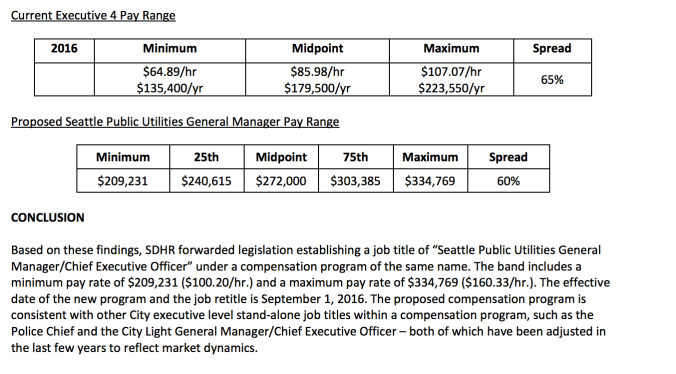Last week, the council’s affordable housing and finance committee approved a proposal from the mayor’s office to raise the salary for the new director of Seattle Public Utilities to as much as $334,000, which would represent a 67 percent pay hike from what the previous director, Ray Hoffman, earned when he retired this year. The pay increase would be accomplished by creating a new pay band—a minimum and maximum salary range—and a new position, to allow the city to go beyond the current $223,000 maximum for the director position.
As they did when giving former City Light director Jorge Carrasco a salary of $210,000 in 2004, making Carrasco the highest-paid city employee—and as they did when justifying an even higher salary, $340,000, for Carrasco’s replacement, Larry Weis—the Seattle Department of Human Resources (SDHR) justified the steep pay hike by saying that its “analysis determined that the City’s current salary range is not competitive with top executive positions at comparable public water utility organizations. If Seattle wants to get the very best candidates to lead major departments, the argument goes, it has to offer a salary competitive with what candidates could get in similar positions elsewhere.
Whether you buy that logic or not (remember, Carrasco ended up leaving under a cloud of controversy in 2015), the fact is that the city doesn’t have to attract a candidate. It already hired one—Mami Hara, who was appointed by Murray in July and confirmed by the full council this past week. Hara initially applied to be director of the Office of Community Planning and Development, which pays $167,000, and was recruited by SDHR to apply at SPU instead. She accepted the position at a salary of $223,000 a year, which is at the top of the current pay band for the job.
So why, council member Lisa Herbold asked SDHR director Susan Coskey last week, was the mayor’s HR department arguing that they needed to offer more money to attract better candidates? Given that they not only had a candidate, but a candidate who had accepted the position and the salary—and would have been willing to accept a significantly lower salary as head of OCPD—the standard argument about attracting the best candidates made little sense
Coskey acknowledged that, yes, Hara had accepted the job at the lower salary. However, she argued, “had this person not been known to us, we would have had to be here to say we are trying to attract the talent.”
And Hara took the job, Coskey continued, with the understanding that the city would go through a separate process and potentially raise her salary later. “As someone who was recruiting her, [I] let her know it was not a competitive salary for this position … and I think this process was taken on faith that there were two processes” going on simultaneously, one to hire an SPU director, the other to raise the salary for that position. “The request we made was, ‘Come, and understand that we are looking at [the salary issue] and the chips will fall where the chips fall,” Coskey said.
Coskey also noted, pointedly but obliquely, that “one of the interesting things, particularly as it relates to workforce equity, is that the fact that someone takes a job doesn’t necessarily mean if it’s way out of whack, that that’s the salary that we should be paying, particularly when you look at this head of a utility compared to the other head of a utility position that we have.” Coskey was referring to the fact that women often accept lower salaries than men do, even in highly competitive positions, and to the fact that Weis’ salary is more than $110,000 higher than the salary Hara accepted.
If you enjoy the work I do here at The C Is for Crank, please consider becoming a sustaining supporter of the site! For just $5, $10, or $20 a month (or whatever you can give), you can help keep this site going, and help me continue to dedicate the many hours it takes to bring you stories like this one every week. This site is run entirely on contributions from readers, which pay for my time (typically no less than 20 hours a week, but often as many as 40) as well as costs like transportation, equipment, website maintenance, and other expenses associated with my reporting. Thank you for reading, and I’m truly grateful for your support.




2 thoughts on “Citing “Competitiveness,” City to Raise New SPU Director’s Pay—Even Though They’ve Already Hired Her”
Comments are closed.